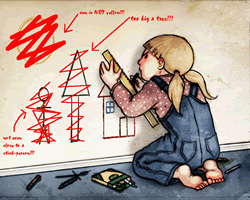 My brother once got 99 per cent in a maths test. He came home pleased with himself until dad said “what went wrong then?” He was probably joking but we did wonder. Many teachers tell me about anxious students – scared of making a mistake, frightened of not getting it right, concerned they won’t be accepted unless they perform / behave / look a certain way, worried about not being perfect.
My brother once got 99 per cent in a maths test. He came home pleased with himself until dad said “what went wrong then?” He was probably joking but we did wonder. Many teachers tell me about anxious students – scared of making a mistake, frightened of not getting it right, concerned they won’t be accepted unless they perform / behave / look a certain way, worried about not being perfect.
This article is a celebration of imperfection and these are the reasons why:
- Whose voice are we listening to? Who is defining what we ‘should’ be, how we ‘should’ perform, what we ‘should’ be aiming for? Self-determination is one of the pillars of authentic wellbeing. In education and in families we need to be helping our children discover their strengths and unique qualities, to value and develop these and decide for themselves who they want to be, how they want to live their lives and what goals matter to them.
- If perfection is the goal what does this say for valuing diversity and difference? In the end perfection is about conforming to a similar set of standards. We often do not notice the subtlety of how much we marginalise those who are not in the main stream. Have a look at any women’s magazine in Australia and check out the positive role models for Aboriginal young women – they simply aren’t there.
I once spent a couple of weeks in Great Ormond Street Hospital for Children in the plastic surgery ward. Every child there was imperfect – webbed feet, missing digits, no ears and much worse – and they were wonderful, vibrant human beings. They appeared to have no problem with their imperfection, it was others who would judge them and perhaps make them realise they didn’t match up to the ideal. Kids who are ‘different’ are often bullied more than others.
Sir Paul Nurse won the Noble Prize for Physiology and Medicine in 2001. I once heard him interviewed and discovered that he nearly didn’t get into university at all because everyone had to pass an exam to show proficiency in a foreign language before being admitted to higher education. He was useless at languages but brilliant at science. It was only when the University of Birmingham found a flexible answer to this problem that he got to do a degree at all – and what a waste that would have been. But how many others were rejected for a similar reason and therefore not able to make the contribution to the world that was in their gift to make?
- None of us are perfect – it’s an unattainable goal so why use up so much energy on it, either for ourselves or for others. If you are looking for a partner who ticks every box and think you have found him or her – beware. Your world may come crashing down when you realise that behind that apparent perfection is a real person, warts and all! And what about you – will your ideal partner want you to match up to their specifications too? If we learn to expect imperfection and know we might need to love someone despite this – and possibly even for it – our relationships are more likely to flourish.
- Being perfect does not endear us to others – it is human to make mistakes, have blemishes, be incomplete. Have you ever spent time with a know-it-all or someone who looks like they just walked out of the pages of Vogue? If you feel inferior by comparison you are not likely to end up becoming the best of friends. Unless of course they have inner strength and beauty and value you just the way you are!
- For our children to stay motivated to learn, change and grow they need to know we are all in the fascinating process of becoming – and none of us are there yet. When adults talk about their own imperfections, kids learn that mistakes are just part of the journey and they are then more likely to develop a growth mind-set. This means seeing effort, not innate ability or characteristics as the way to achievement.
- Perfectionism can stifle creativity, innovation and resilience. If you think you will only be valued if you get things right you are much less likely to have a go and see what happens. In order to become confident you need to take the occasional risk and know that failing is not the end of the world. And adventures don’t always need an achievement goal. Just having them can be enough.
- Perfectionism can be a pathway to depression. As no-one can ever live up to unrealistic expectations, life can become an on-going disappointment. If you constantly compare yourselves to others you won’t learn to love yourself for who you are. Any you won’t love others either if you are always focused on who is better at what rather than the qualities that make them unique.
- So perfectionism disconnects us. People who think they have to strive to be what they are not in order to belong and be accepted are on a hiding to nothing. If we fear not being perfect we will live with a mask that hides who we really are. We might try to cover up all bad choices, mistakes or failures, be cheerful when we are feeling sad, pretend all is going well when it really isn’t. We end up disconnected not just from others but from our true selves. You can only keep this up for so long and may end up isolated in the effort.
- Perfectionism means misery – if we are only satisfied with what is flawless then we will never value the many moments of life that are joyful despite the cracks. I love Leonard Cohen’s take on this:
“Forget your perfect offering. There is a crack in everything, that’s how the light gets in”
So what needs to happen instead?
Except where someone might be hurt:
- Accept and celebrate the eccentric, the bizarre and the extraordinary – it is often where the richness of life and creativity exists
- Challenge concepts of what is ‘normal’ and ‘abnormal’
- Acknowledge mistakes and failures as pathways to learning and ‘becoming’
- Model imperfection so kids know its OK to get things wrong sometimes and will be less anxious about how they perform and have a go at things anyway
- Applaud others who admit they got it wrong
- Demand promotion of diversity in every sphere of life – but especially the media, education and politics
- Identify and celebrate unique strengths and qualities in yourself and others
- Fit your expectations to your child, not your child to your expectations
- Give yourself peace of mind – it is such a weight off your shoulders to accept who you are and who you are becoming rather than aiming for perfection!
My daughter has just told me that Brene Brown has published a book called the Gifts of Imperfection (2010 Hazelden). I didn’t know that – but at least I am in good company!


